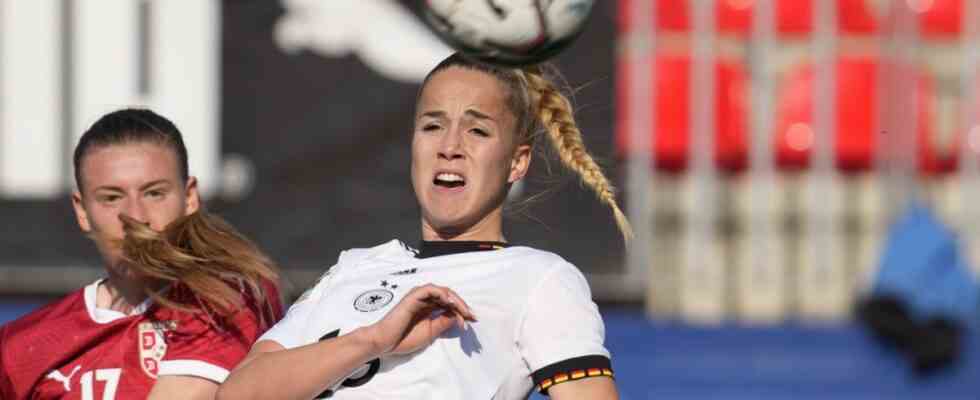Referee Tess Olofsson had just finished the game at the stadium of the Serbian Football Union Sports Center when one of the teams erupted in enthusiastic celebrations. Players hugged each other, laughed and didn’t know what to do with their joy. Nothing unusual, but it was cheering: the others. Those who had expected to show off with such gestures ran across the lawn with slumped shoulders and solemn eyes. There was pure disappointment mixed with helplessness and frustration at what had just happened. This bitter mixture was really not intended as an after-work drink in Stara Pazova.
The German internationals had actually lost 2:3 (0:1) against Serbia instead of being able to plan the trip to the 2023 tournament in Australia and New Zealand prematurely thanks to their eighth win in the eighth World Cup qualifier. The remaining qualifiers in Turkey and Bulgaria in September are more important than expected. In Group H, the lead over Serbia is three points, only the first qualifies directly, the second has to go to the playoffs – unimaginable for the two-time world and eight-time European champion.
Thoughtful national coach: Martina Voss Tecklenburg
(Photo: Marko Metlas/Camera 4/International/Imago)
The performance on Tuesday afternoon was more worrying than because of the (not yet acutely threatening) table situation, because this qualification also represents preparation for the highlight in 2022, the European Championship in England (July 6th to 31st). The last competitive game before this should strengthen self-confidence, consolidate the game idea and automatisms. Now a lot of doubts traveled from Serbia. Did everyone just stupidly have a bad day at the same time? Or was that rather another answer to the question that has occupied the DFB team for a long time: where do we stand?
“It was just a really bad performance in many areas,” says national coach Martina Voss-Tecklenburg
Immediately after the game, national coach Martina Voss-Tecklenburg was self-critical and downright stunned at how her players had allowed themselves to be taken by surprise. The Serbs dominated, they appeared physically robust, attacked quickly and cleverly, while the Germans seemed almost permanently overwhelmed and hardly got any rest. “I don’t want to make any excuses, it was just a really bad performance in many areas,” said the 54-year-old: “I also missed emotional leaders today. There’s a lot coming together.”
She self-critically criticized, among other things, duel behavior, passivity, a high error rate, lack of mentality and pass quality: “All the factors that would have been important weren’t there. That continued in a shocking way for 90 minutes. We have to chalk that up to ourselves.” After this setback, Voss-Tecklenburg still has three courses in June, including a test match, in order to draw the right conclusions from the most recent performance.
Outstanding on offense: Jovana Damnjanovic (left) from FC Bayern scores twice in the World Cup qualifier against Germany, Allegra Poljak once. Lea Schüller and Tabea Waßmuth scored the goals for the DFB women.
(Photo: Marko Metlas/Camera 4/International/Imago)
When her team finished last in the Arnold Clark Cup preparatory tournament against Spain, Canada and England to kick off this important year in February, their commitment and dynamism stood out. In view of 14 cancellations, including central players like Dzsenifer Marozsan and Alexandra Popp, a lack of dominance and a lack of victories could be explained. But now almost everyone was there and looked in good form in the convincing 3-0 win against Portugal on Saturday. After the appearance against Serbia, however, the alarm bells should ring three months before the European Championship.
Apart from a fundamental improvement in the performance of the highly talented squad, the Germans must above all call up their skills more consistently – otherwise the difficult group phase against Denmark, Spain and Finland in the summer may become a problem. Disappointments like the EM 2017 and World Cup 2019 – which ended in the quarterfinals – and missed Olympic Games should be a thing of the past. “We have to learn our lessons from this and come back stronger,” said captain Popp, who started again after almost a year out injured: “It’s better now than at the European Championships. Who knows what it’s good for in the end. “

